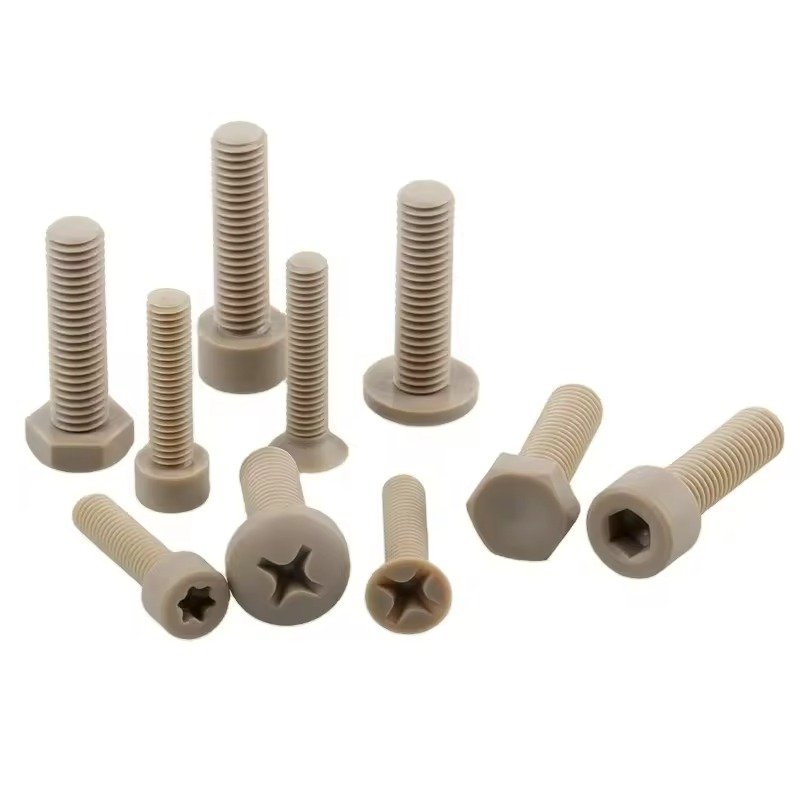3 Classification Methods of Plastic Screws
Classification by Material Type
- Nylon Screws: PA6 (Nylon 6), PA66 (Nylon 66)
Features: High strength, high toughness, good insulation, self-lubrication, low friction coefficient, and chemical resistance - Polypropylene Screws: PP
Features: Excellent chemical resistance, low density, light weight, and low cost - Polyvinyl Chloride Screws: PVC (including CPVC – Chlorinated Polyvinyl Chloride)
Features: Excellent corrosion resistance and flame retardancy - Polytetrafluoroethylene Screws: PTFE (Teflon)
Features: Known as the “King of Plastics.” Extremely low friction coefficient: Excellent lubricity, non-stick properties, and a wide operating temperature range (-200°C to +260°C). - Polyetheretherketone Screws: PEEK
Features: Near-metal strength, hardness, and creep resistance, as well as extremely high heat resistance: Long-term operating temperatures exceeding 250°C are possible. - Polyoxymethylene Screws: POM (Saigang/Trane)
Features: High stiffness and hardness: Stiffness and strength approach those of metal, low coefficient of friction, and excellent self-lubrication. - Composite Screws: Glass Fiber Reinforced Polymer (GFRP).
Features: Extremely high strength-to-weight ratio: Strength comparable to high-strength steel, yet extremely lightweight, fully insulated, and non-magnetic.
Classification by Head Type and Drive Method
- Head shapes: Pan head, countersunk head, countersunk head, cylindrical head, hexagonal head, etc.
- Drive methods: Slotted head, Phillips head, hexagon socket, Torx head, square head, etc.

Classification by Manufacturing Process
- Injection Molded Screws
Features: High production efficiency, low cost, and suitable for large-scale production. - Machine-Made Screws
Features: Cut from bar stock using a lathe or CNC machining center. High dimensional accuracy allows for customized dimensions and head shapes, and mechanical properties surpass those of injection molded parts.
Polymer Plastic Screws Have a Wide Range of Applications
Automotive Industry: Polymer plastic screws are commonly used in the automotive industry due to their high strength and wear resistance. They are used to fasten various vehicle components, such as engines and transmissions.
Aerospace Industry: Polymer plastic screws are commonly used in the aerospace industry due to their high strength and durability. They are used to fasten various aircraft components, such as engines and fuselages.
Construction Industry: Polymer plastic screws are commonly used in the construction industry due to their ability to withstand harsh weather conditions. They are used to fasten various building components, such as roofs and wall panels.
Electrical Industry: Polymer plastic screws are commonly used in the electrical industry due to their insulating properties. They can be used to secure various parts of electrical systems, such as circuit boards and wiring.
Furniture Industry: Polymer plastic screws are commonly used in the furniture industry due to their lightweight and corrosion resistance. They can be used to secure various parts of furniture, such as tables and chairs.
In summary, polymer plastic screws are a versatile and practical fastener used in a wide variety of applications. They possess many unique properties, such as high strength, high toughness, chemical resistance, and insulation, making them well-suited for many different types of industries.